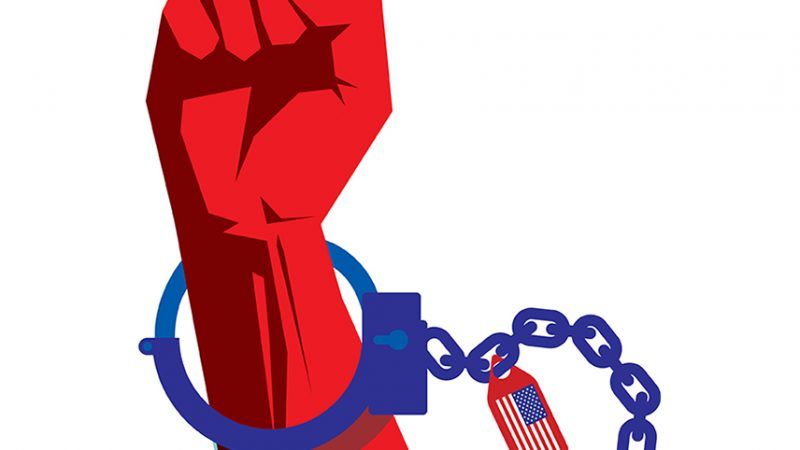From Washington to Wisconsin, States Are Punishing Dissent
Faced with the possibility of fines or legal battles, many will choose not to speak at all.

Just over a year ago, after the Trump administration gave the green light to move forward with construction of the Dakota Access Pipeline, an activist group called Red Line Salish Sea staged a peaceful protest in Bellingham, Washington. Demonstrators blocked traffic on a highway for nearly an hour before dispersing. One of the organizers told The Bellingham Herald that "I hope that people take away that it was just a temporary inconvenience, but [pipelines] are impacting people's lives" in more substantial ways.
The county prosecutor's office responded with a disorderly conduct and reckless endangerment investigation of the demonstrators. To uncover their identities, officials repeatedly attempted to obtain a warrant for private information from the group's Facebook page. As the protesters' attorney noted, "The warrant and the county's pleadings do not so much as acknowledge the existence of the First Amendment, nor that this was a demonstration, but simply treat it as supposed criminal activity like a bar fight or drunk driving."
The first two warrant applications were withdrawn after the American Civil Liberties Union and Facebook fought back, noting that they would chill political speech and association. So county prosecutor David McEachran went to the feds, and the Department of Justice chimed in with tips on how to craft a warrant to pass constitutional muster.
Third time was the charm. Must be nice to have friends in high places.
The Washington Court of Appeals declined to stop the warrant, and Facebook was forced to disclose copious amounts of information about the page and its visitors, including the account names of everyone "going," "interested," and "invited" to the protest, contact information for the group's administrators, and all status updates, messages, videos, pictures, and other content tagged on the page.
The court acknowledged a precedent set in the case NAACP v. Alabama, a civil rights–era ruling that prevented that state from forcing the National Association for the Advancement of Colored People to turn over a list of its members to the government. But it decided the decision didn't apply to Red Line Salish Sea, reasoning that the group's members wouldn't face the same harassment and reprisal if their ties were revealed.
Tell that to Michelle Vendiola. After she was outed online, her employer, Western Washington University, faced a wave of public pressure to fire her. A coworker even initiated an ethics investigation. The state looked into it and concluded no violation had occurred, but the university chose not to renew her contract anyway.
Abuses of this sort aren't limited to one side of the political aisle, as a group of conservative citizens in Wisconsin know all too well. Their own saga began around 2010, when the Milwaukee County District Attorney's Office opened a secret probe into the Milwaukee County Executive's Office, run at the time by then-gubernatorial candidate Scott Walker.
Three years later, Wisconsinites affiliated with right-of-center groups that had supported Gov. Walker's collective bargaining reforms had their homes raided by police officers in full riot gear before dawn. American citizens watched law enforcement officers confiscate their personal computers and cellphones, and gag orders prevented those affected from talking about the experience—they couldn't even explain the situation to neighbors who watched the spectacle unfold.
Just when the ordeal appeared to be over, a leak to The Guardian triggered another investigation in 2016. While searching a public building for a missing hard drive, the state Department of Justice then uncovered a file cabinet stuffed with years' worth of personal communications by Republicans—the fruits of an apparent government spying operation on Walker supporters. The cache was labeled "opposition research."
These are different types of abuses of authority, but the crux of the issue is the same: Government officials are wielding regulations and investigations as weapons to silence dissent. Small citizens groups often don't have the means to hire lawyers and accountants to ensure they stay within the confines of complex laws governing political speech. Faced with the possibility of fines or legal battles, many will choose not to speak at all.
This article originally appeared in print under the headline "From Washington to Wisconsin, States Are Punishing Dissent."

Show Comments (65)